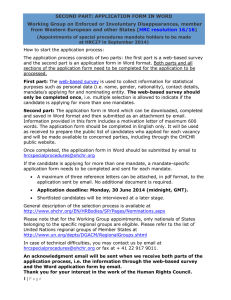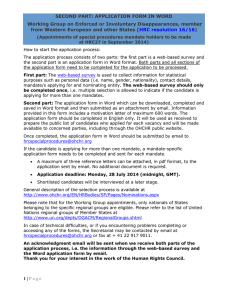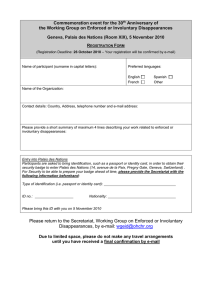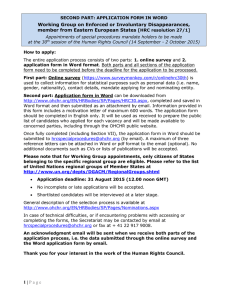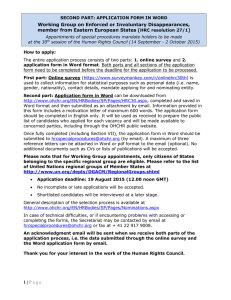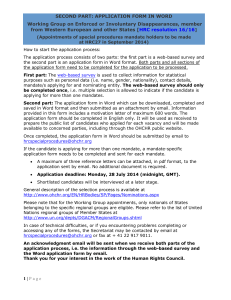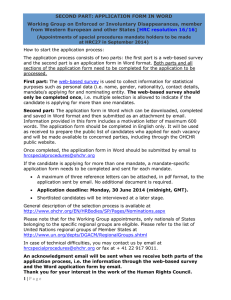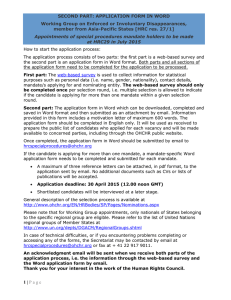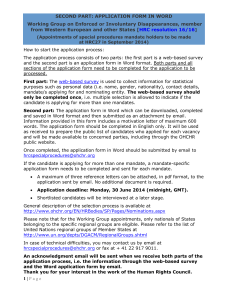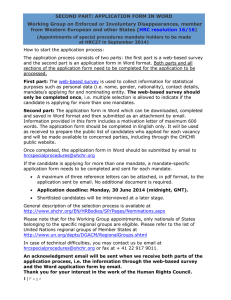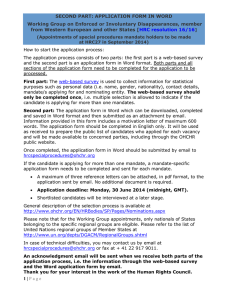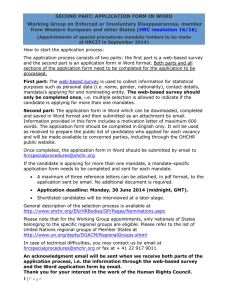SECOND PART: APPLICATION FORM IN WORD [
advertisement
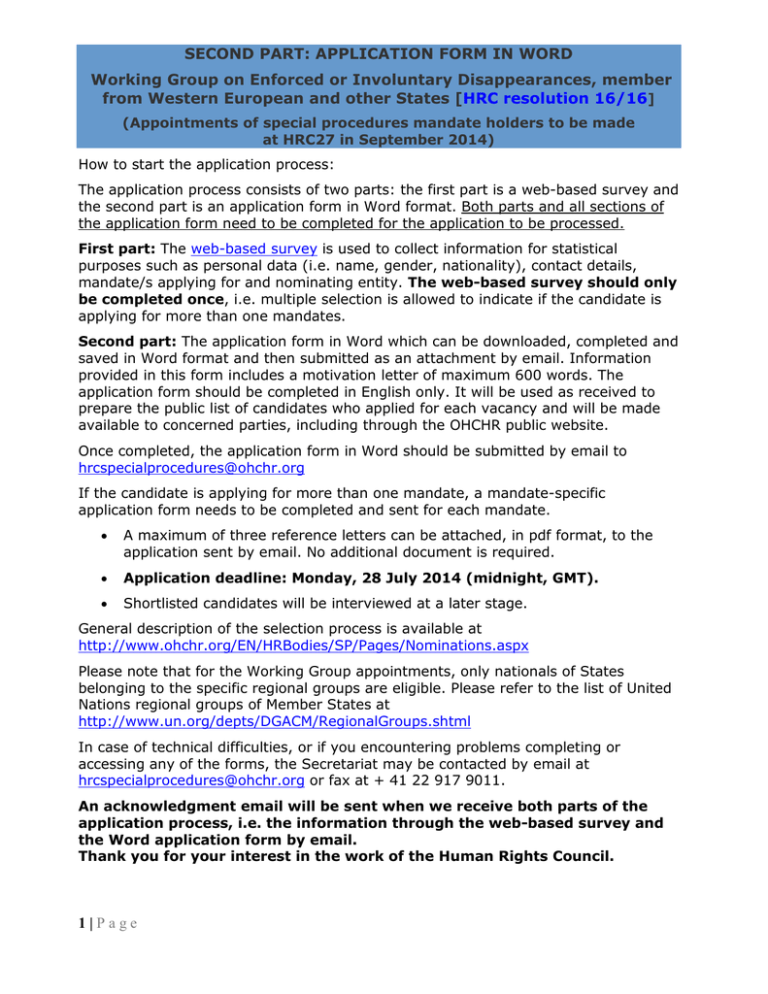
SECOND PART: APPLICATION FORM IN WORD Working Group on Enforced or Involuntary Disappearances, member from Western European and other States [HRC resolution 16/16] (Appointments of special procedures mandate holders to be made at HRC27 in September 2014) How to start the application process: The application process consists of two parts: the first part is a web-based survey and the second part is an application form in Word format. Both parts and all sections of the application form need to be completed for the application to be processed. First part: The web-based survey is used to collect information for statistical purposes such as personal data (i.e. name, gender, nationality), contact details, mandate/s applying for and nominating entity. The web-based survey should only be completed once, i.e. multiple selection is allowed to indicate if the candidate is applying for more than one mandates. Second part: The application form in Word which can be downloaded, completed and saved in Word format and then submitted as an attachment by email. Information provided in this form includes a motivation letter of maximum 600 words. The application form should be completed in English only. It will be used as received to prepare the public list of candidates who applied for each vacancy and will be made available to concerned parties, including through the OHCHR public website. Once completed, the application form in Word should be submitted by email to hrcspecialprocedures@ohchr.org If the candidate is applying for more than one mandate, a mandate-specific application form needs to be completed and sent for each mandate. A maximum of three reference letters can be attached, in pdf format, to the application sent by email. No additional document is required. Application deadline: Monday, 28 July 2014 (midnight, GMT). Shortlisted candidates will be interviewed at a later stage. General description of the selection process is available at http://www.ohchr.org/EN/HRBodies/SP/Pages/Nominations.aspx Please note that for the Working Group appointments, only nationals of States belonging to the specific regional groups are eligible. Please refer to the list of United Nations regional groups of Member States at http://www.un.org/depts/DGACM/RegionalGroups.shtml In case of technical difficulties, or if you encountering problems completing or accessing any of the forms, the Secretariat may be contacted by email at hrcspecialprocedures@ohchr.org or fax at + 41 22 917 9011. An acknowledgment email will be sent when we receive both parts of the application process, i.e. the information through the web-based survey and the Word application form by email. Thank you for your interest in the work of the Human Rights Council. 1|Page SECOND PART: APPLICATION FORM IN WORD Working Group on Enforced or Involuntary Disappearances, member from Western European and other States [HRC resolution 16/16] (Appointments of special procedures mandate holders to be made at HRC27 in September 2014) I. PERSONAL DATA 1. Family name: Cerone 5. Sex: 2. First name: John 6. Date of birth (dd-mm-yy): 31May-72 7. Place of birth: USA 8. Nationality (please indicate the 3. Maiden name (if any): 4. Middle name: Peter Male Female nationality that will appear on the public list of candidates): USA 9. Any other nationality: II. MANDATE - SPECIFIC COMPETENCE / QUALIFICATIONS / KNOWLEDGE NOTE: Please describe why the candidate’s competence / qualifications / knowledge is relevant in relation to the specific mandate: 1. QUALIFICATIONS (200 words) Relevant educational qualifications or equivalent professional experience in the field of human rights; good communication skills (i.e. orally and in writing) in one of the six official languages of the United Nations (i.e. Arabic, Chinese, English, French, Russian, Spanish.) I am a Professor of International Law specializing in International Human Rights Law and International Humanitarian Law. I hold several relevant university degrees and have engaged extensively in the practice of international human rights law and humanitarian law at both the field and headquarters levels. As a practicing international lawyer, I have worked for a number of different intergovernmental and nongovernmental organizations, including the United Nations, the Organization for Security and Cooperation in Europe, the International Secretariat of Amnesty International, and the International Crisis Group, and have served as a legal adviser to various international criminal courts and tribunals. I also have extensive field experience in conflict and post-conflict environments, such as Afghanistan, Kosovo, Sierra Leone, and East Timor. My first language is English. I am conversant in Spanish and have reading knowledge of French. 2|Page SECOND PART: APPLICATION FORM IN WORD Working Group on Enforced or Involuntary Disappearances, member from Western European and other States [HRC resolution 16/16] (Appointments of special procedures mandate holders to be made at HRC27 in September 2014) 2. RELEVANT EXPERTISE (200 words) Knowledge of international human rights instruments, norms and principles. (Please state how this was acquired.) Knowledge of institutional mandates related to the United Nations or other international or regional organizations’ work in the area of human rights. (Please state how this was acquired.) Proven work experience in the field of human rights. (Please state years of experience.) I have been working in human rights and humanitarian law for the past 15 years. I have worked as a Human Rights Officer and Legal Advisor with the UN Mission in Kosovo, I have undertaken missions on behalf of Amnesty International to examine women's acces to justice, I have engaged in war crimes documentation for the International Crisis Group, and I have assisted victims of human rights violations to file communications and appeals for inquiries with UN treaty bodies. I have lectured specifically on the issue of secret detention and enforced disappearances for the Institut International des Droits de l'Homme, and I have taught in a number of human rights study programs at other leading institutions, including the Danish Institute for Human Rights, the Raoul Wallenberg Institute, and the Irish Center for Human Rights. In the realm of IHL, I have lectured at the International Institute of Humanitarian Law (Sanremo), at the Naval War College, and in the Annual Course of the International Committee of the Red Cross. I have also advised the President of the ICTR and the Prosecutor of the Special Court for Sierra Leone on a range of legal issues arising under humanitarian law and international criminal law. 3|Page SECOND PART: APPLICATION FORM IN WORD Working Group on Enforced or Involuntary Disappearances, member from Western European and other States [HRC resolution 16/16] (Appointments of special procedures mandate holders to be made at HRC27 in September 2014) 3. ESTABLISHED COMPETENCE (200 words) Nationally, regionally or internationally recognized competence related to human rights. (Please explain how such competence was acquired.) In recognition of my extensive research / publication record, I have been awarded fellowships at the Max Planck Institute for Comparative Public Law and International Law and at the International Criminal Court, and been a Fulbright scholar at both the Danish Institute for Human Rights and the Tokyo University of Foreign Studies. I have received the President’s Award of the Boston Bar Association for my legal work on Guantanamo Bay issues, which has included representing international human rights organizations in detainee litigation before US courts and international human rights institutions. I also serve as U.S. Member of the International Law Association’s (ILA) International Human Rights Law Committee. I previously served as Co-Chair of the Human Rights Interest Group of the American Society of International Law (ASIL), and as Chair of the International Human Rights Section of the Association of American Law Schools. I am accredited by the UN to represent ASIL before various U.N. bodies. I am an elected member of the International Institute of Humanitarian Law and have served in the ICRC Expert Group on the Law of Occupation. I have recently been appointed Distinguished Chair in Human Rights & Humanitarian Law at the Raoul Wallenberg Institute. 4. FLEXIBILITY/READINESS AND AVAILABILITY OF TIME (200 words) to perform effectively the functions of the mandate and to respond to its requirements, including participating in Human Rights Council sessions in Geneva and General Assembly sessions in New York, travelling on special procedures visits, drafting reports and engaging with a variety of stakeholders. (Indicate whether candidate can dedicate an estimated total of approx. three months per year to the work of a mandate.) As an academic, I am expected to devote approximately one quarter of my time to public service. As such, I am able to donate three months per year to the work of the mandate. Also, I am already accustomed to travelling internationally (trans-Atlantic or trans-Pacific) for work at least once per month 4|Page SECOND PART: APPLICATION FORM IN WORD Working Group on Enforced or Involuntary Disappearances, member from Western European and other States [HRC resolution 16/16] (Appointments of special procedures mandate holders to be made at HRC27 in September 2014) III. MOTIVATION LETTER (600 word limit) Enforced dissapearances entail numerous and grave violations of the human rights of individuals. They have occured throughout history and across a broad range of contexts. My experiences as an academic and as a practitioner make me particularly well-suited to understanding the complexity of these contexts and the related legal and political issues. Much of my research and writing has been devoted to particular legal issues typically implicated by enforced disappearances. For example, I have written extensively on the simultaneous application of human rights law and humanitarian law -- an issue that arises whenever disappperanes take place in the context of armed conflict. My work also explores the intersection of human rights law and international criminal law, which is the very space inhabited by this international crime. I have also done substantial work on the subject of non-state actors – an issue of increasing importance in the present context. Another area of my work focuses on the extraterritorial application of international human rights law, which would arise whenever individuals are placed beyond the territorial borders of the respective state. Finally, I have worked on the issue of derivative liability in the context of secret detention, which arises in situations where there may be a multipliticy of actors involved. As noted above, in 2009 I was invited by the Institut International des Droits de l'Homme to lecture specifically on the subject of secret detention and enforced disappearances in their annual human rights study course. In addition to my academic work, I have extensive field experience in conflict and post-conflict environments. In particular, I have worked on the issue of disappearances at the field level, having been responsible for documenting cases of missing persons as a Human Rights Officer with the UN Mission in Kosovo. As a legal practitioner, I have undertaken a number of projects in the area of women’s human rights, and with the CEDAW Committee in particular. My expertise in the area of women’s human rights law is imporant in ensuring the application of a gender perspective, as mandated by the Council. I would also be well-positioned to consider the Council’s mandate to consider the issue of impunity, in light of my experiences advising several international criminal court judges and prosecutors. 5|Page SECOND PART: APPLICATION FORM IN WORD Working Group on Enforced or Involuntary Disappearances, member from Western European and other States [HRC resolution 16/16] (Appointments of special procedures mandate holders to be made at HRC27 in September 2014) IV. LANGUAGES (READ / WRITTEN / SPOKEN) Please indicate all language skills: Mother tongue: English Arabic: Yes or no: No If yes, Read: Easily or Not easily: Write: Easily or Not easily: Speak: Easily or Not easily: Chinese: Yes or no: No If yes, Read: Easily or not easily: Write: Easily or not easily: Speak: Easily or not easily: English: Yes or no: Yes If yes, Read: Easily or not easily: First lang Write: Easily or not easily: First lang Speak: Easily or not easily: First lang French: Yes or no: YesIf yes, Read: Easily or not easily: Easily Write: Easily or not easily: Not easily Speak: Easily or not easily: Not easily Russian: Yes or no: NoIf yes, Read: Easily or not easily: Write: Easily or not easily: Speak: Easily or not easily: Spanish: Yes or no: YesIf yes, Read: Easily or not easily: Easily Write: Easily or not easily: Not Easily Speak: Easily or not easily: Easily 6|Page SECOND PART: APPLICATION FORM IN WORD Working Group on Enforced or Involuntary Disappearances, member from Western European and other States [HRC resolution 16/16] (Appointments of special procedures mandate holders to be made at HRC27 in September 2014) V. EDUCATIONAL RECORD NOTE: Please list the candidate’s academic qualifications (university level and higher). Name of degree and name of academic institution: Years of attendance (From/To): Place and country: LLM, New York University School of Law 1998-99 New York, USA Juris Doctor, Notre Dame Law School 1995-98 Indiana, USA BS in Computer Engineering, The Cooper Union School of Engineering 1990-95 New York, USA 7|Page SECOND PART: APPLICATION FORM IN WORD Working Group on Enforced or Involuntary Disappearances, member from Western European and other States [HRC resolution 16/16] (Appointments of special procedures mandate holders to be made at HRC27 in September 2014) VI. EMPLOYMENT RECORD NOTE: Please briefly list ALL RELEVANT professional positions held, beginning with the most recent one. Name of employer, functional title, main functions of position: Years of work (From/To): Place and country: The Fletcher School of Law & Diplomacy 2013Tufts University present Visiting Professor of International Law (teaching International Organizations, International Humanitarian Law, and International Criminal Justice) Medford, MA, USA New England School of Law Professor of Law (full professor) (teaching Public International Law, International Human Rights Law, International Criminal Law, Nonstate Actors in International Law, Constitutional Law) 2004-2013 Boston, MA, USA War Crimes Research Office American University Washington Colllege of Law Executive Director (directed research office providing legal research assistance to international criminal courts and tribunals) 2001-2004 Washingt on, DC, USA UN Mission in Kosovo (OSCE Pillar) Human Rights Officer and Legal Advisor (examined the conduct of those exercising public power for compliance with international human rights standards, and took appropriate follow-up action, including direct intervention with the responsible authorities and recommendations for action on a political level) 1999-2001 Mitrovica & Pristina, Kosovo 8|Page SECOND PART: APPLICATION FORM IN WORD Working Group on Enforced or Involuntary Disappearances, member from Western European and other States [HRC resolution 16/16] (Appointments of special procedures mandate holders to be made at HRC27 in September 2014) VII. COMPLIANCE WITH ETHICS AND INTEGRITY PROVISIONS (of Human Rights Council resolution 5/1) 1. To your knowledge, does the candidate have any official, professional, personal, or financial relationships that might cause him/her to limit the extent of their inquiries, to limit disclosure, or to weaken or slant findings in any way? If yes, please explain. No 2. Are there any factors that could either directly or indirectly influence, pressure, threaten, or otherwise affect the candidate’s ability to act independently in discharging his/her mandate? If yes, please explain: No 3. Is there any reason, currently or in that past, that could call into question the candidate’s moral authority and credibility or does the candidate hold any views or opinions that could prejudice the manner in which she/he discharges his mandate? If yes, please explain: No 4. Does the candidate comply with the provisions in paragraph 44 and 46 of the annex to Human Rights Council resolution 5/1? Para. 44: The principle of non-accumulation of human rights functions at a time shall be respected. Para. 46: Individuals holding decision-making positions in Government or in any other organization or entity which may give rise to a conflict of interest with the responsibilities inherent to the mandate shall be excluded. Mandate-holders will act in their personal capacity. Yes 9|Page SECOND PART: APPLICATION FORM IN WORD Working Group on Enforced or Involuntary Disappearances, member from Western European and other States [HRC resolution 16/16] (Appointments of special procedures mandate holders to be made at HRC27 in September 2014) 5. Should the candidate be appointed as a mandate holder, he/she will have to take measures to comply with paragraphs 44 and 46 of the annex to Council resolution 5/1. In the event that the current occupation or activity, even if unpaid, of the candidate may give rise to a conflict of interest (e.g. if a candidate holds a decision-making position in Government) and/or there is an accumulation of human rights functions (e.g. as a member of another human rights mechanism at the international, regional or national level), necessary measures could include relinquishing positions, occupations or activities. If applicable, please indicate the measures the candidate will take. Not applicable **** 10 | P a g e
